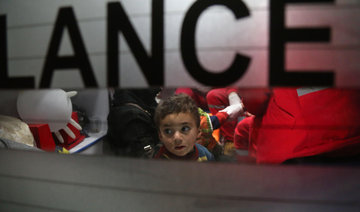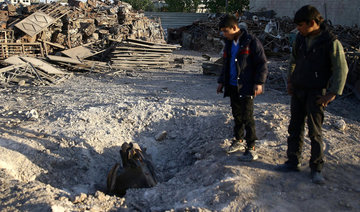BEIRUT: Before Eastern Ghouta there was Homs, Aleppo, Daraya — rebel towns and enclaves that the Syrian regime pounded and besieged, forcing fighters to give up their arms and civilians to flee.
Syria’s third city Homs was dubbed the “capital of the revolution,” after anti-government protests erupted in March 2011, but from 2012 it came under a two-year siege.
In 2014, rebels cornered by advancing regime forces agreed to be evacuated, although the government went on to besiege Waer, the last remaining opposition-held district in the city.
During the siege nearly 2,200 people were killed in the Homs’s Old City, according to the Syrian Observatory For Human Rights.
In the historic center of the city, completely in ruins, those remaining had virtually nothing left to eat and lived off grass and dry foods.
Between March and May 2017, thousands of rebels and civilians fled the district of Waer, allowing the regime’s forces to retake full control of Homs.
Once Syria’s commercial hub, Aleppo was devastated by more than four years of fighting, particularly along the front line that separated the rebel-held east from the government-held west.
Early in 2016, the regime’s forces, supported by Lebanese movement Hezbollah and Russian warplanes, launched an offensive in Aleppo.
Much of the city was reduced to wasteland.
Rebel districts were under near-continuous siege by the army. Heavy shelling by the army destroyed all established hospitals in the area.
Towards the end of 2016, after a month of respite, bombardments picked up again and international observers talked about “crimes against humanity” committed by the regime and its Russian allies.
In December 2016, the Syrian army declared it was in full control of Aleppo.
Daraya was one of the first towns in Syria to erupt in demonstrations against the government in 2011; it also became one of the first to be placed under a strict regime siege in 2012.
The Syrian army recaptured the town in 2016 after the evacuation of thousands of rebels and civilians who had been under a relentless siege and incessant bombardment.
In 2017, the army recaptured the region of Wadi Barada near Damascus as well as several rebel districts in the capital.
Thousands of civilians and fighters were bussed to the northwestern province of Idlib.
In recent months, the regime has recaptured several rebel areas around Damascus under so-called “reconciliation” deals involving the evacuation of fighters in exchange for an end to bombardments and sieges.
In a report titled “We leave or we die,” Amnesty analyzed four local accords which the rights body said were preceded by unlawful sieges and bombardment aimed at forcing civilians to abandon their homes.
“The Syrian government and, to a lesser degree, armed opposition groups have enforced sieges on densely populated areas, depriving civilians of food, medicine and other basic necessities in violation of international humanitarian law,” Amnesty said.






















